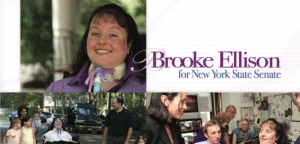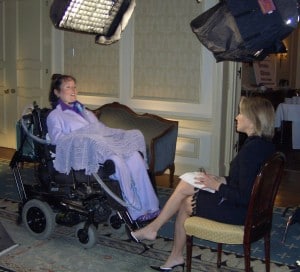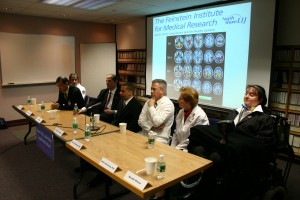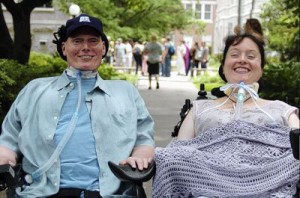The Brooke Ellison Story: A Lesson in ‘No Excuses’ for All of Us
November 30, 2011

Brooke Ellison's campaign literature
By Kathy Groob, Publisher ElectWomen Magazine -There aren’t enough women running for public office and among those women who might consider becoming a candidate, many do not because of time constraints, family obligations, fears of negative campaign attacks and a host of other reasons. For Brooke Ellison, obstacles did not deter her. She ran for the state senate in New York despite being a quadriplegic, connected to a ventilator and confined to her wheelchair.
When she was 11-years-old, Ellison was hit by a car while on her way home from school and was paralyzed from the neck down. Despite her physical condition, Ellison was determined to complete her education. Ten years later, she graduated magna cum laude from Harvard University and delivered the commencement address to her classmates in 2000. Ellison continued on to complete her Master’s degree from the Kennedy School of Public Policy at Harvard University.
While working as a public speaker, Ellison became a strong advocate for health care issues and stem cell research. After receiving a disappointing response from her state senator with regard to stem cell research, Ellison thought that she might be the person to help bring these complicated issues to light.
“If I ran for office it could be possible that I could bring these issues to the forefront that would ultimately have a direct effect on people’s lives,” says Ellison.

Brooke being interviewed by Katie Couric
Ellison also believed that by entering the political arena, she would be making a strong statement that females and people with disabilities could run for office.
Her campaign took shape with typical campaign activities. Ellison sought out support from key leaders in her party at the state and local levels. She received enthusiastic support as she planned her platform and developed her knowledge about the political process and key issues.
Supported by her mother and family, Ellison set out to speak to voters. The odds were long that Ellison would win the race – not because she was disabled but because she was running as a Democrat in a heavily Republican district. Teams of volunteers joined the campaign as word spread about Ellison’s race and her vision.
It was difficult for Ellison to knock on doors because of accessing steps and front doors in a wheelchair. Instead, volunteers knocked on doors and voters came out to the end of their driveways or sidewalk to meet and talk with Ellison.
“During the summer and into fall, we had people knocking on doors every evening from about 5 until 8:30 p.m.,” says Ellison.
Communicating with voters proved to be a positive experience.
“Nobody said I don’t think you can serve in the legislature, but some asked ‘how are you going to do it?’ The questions forced me to think it through and I determined it was something I believed that I could do. I’ve been through more difficult odds in my life and I considered myself victorious in other areas,” says Ellison. “Running for office was not that difficult and paled in comparison. I knew that I had refocused my life before to learn how to live again. Doing that was a much bigger obstacle than running or serving in public office.”
“We need more women to engage in political process,” says Ellison. “There is a gross disparity with so many women in the United States and those who actually end up running and becoming elected to office. Women are profoundly affected by legislation that is passed and women’s rights and lives are heavily affected by policies that are made. We must be more involved in the process.”
Ellison received 45 percent of the vote in her bid for senate in the 2006 general election. She is currently working towards her doctorate in science policy and bioethics at Stony Brook University, where she teaches classes on medical ethics while working on her dissertation.
 “Working to promote embryonic stem cell research through activism and public speaking, Brooke fights for people with dire health conditions—people who she says will benefit monumentally from stem cell research,” says the Center for American Progress.
“Working to promote embryonic stem cell research through activism and public speaking, Brooke fights for people with dire health conditions—people who she says will benefit monumentally from stem cell research,” says the Center for American Progress.
Not sure if she will run for office again, Brook believes things much change is needed.
“A lot of things need to be done differently. Society needs to deal with things in a more upfront way. Challenges need to be addressed. If I run again, it would have to be under the right circumstances and for the right reasons,” says Ellison.

Brooke with Christopher Reeve
Note: In January 2002, Brooke and her mother, Jean Ellison, published a book titled The Brooke Ellison Story, which documents their family’s experiences from the day of Brooke’s accident until their graduation from Harvard in 2000. The book was made into a movie, directed by Christopher Reeve, which first aired on A&E and is currently airing on Lifetime Television Network.
